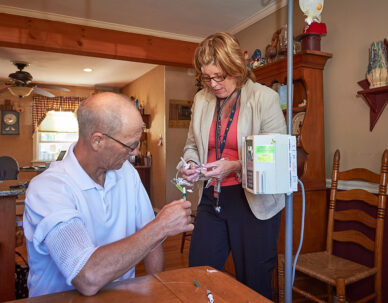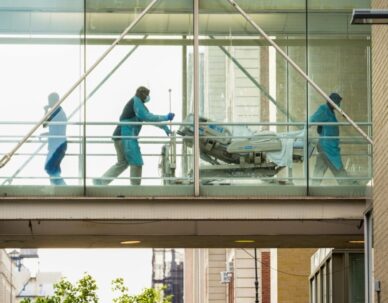PC3I Fellow To Study Racial Disparities in New Cancer Treatment
June 22, 2020
PC3I Fellow Chris Manz, MD, will receive a 2020 Young Investigator Award from Conquer Cancer, the ASCO Foundation. The Young Investigator Award provides funding to promising investigators to encourage and promote quality research in clinical oncology. The award will support Dr. Manz’s efforts to study the effect of Medicare’s Oncology Care Model on disparities in patient access to new cancer therapies.

Cancer care is steadily improving, with more than 50 new drugs or new uses for old drugs for cancer patients approved in 2018 alone. While these advances can often improve survival or reduce cancer recurrence, not all eligible patients receive the new treatments when they are first made available. Economic factors like drug cost and social factors like patient race influence whether patients may receive a new treatment when it first becomes available, leading to unequal access to new treatments. In the first years after FDA approval, both race and socioeconomic factors like low income have been associated with lower likelihood of receiving genetic testing, new radiation modalities, and new treatments. For example, examination of data from the National Cancer Data Base, a nationwide, hospital-based cancer registry by Flowers and colleagues found that even seven years after the initial FDA approval of one cancer drug, rituximab, in 1997, black patients were less likely to be receiving it than others.
To confront rising healthcare costs, Medicare is experimenting with an alternative way to pay for cancer care, called the Oncology Care Model (OCM), but there is not yet clear evidence about how the new model is affecting access to new treatments, particularly with regard to racial disparities. Under OCM, oncologists volunteer to be subject to new Medicare reimbursement rules that are intended to provide higher quality cancer care at the same or lower price. OCM rewards oncologists if they provide high quality care while maintaining or reducing their costs for treating Medicare cancer patients below certain historical cost thresholds. Because of this, OCM may discourage oncologists from using newer but more expensive drugs, delaying access for their patients to new treatment advances. The effect may be even larger in patient populations, such as black or low income patients, who already have delayed access to new treatments.
OCM adopted a policy to try to overcome this incentive. OCM includes a novel therapies adjustment for two years after FDA approval of a new indication that increases the allowable cost threshold. Cost simulations suggest that this adjustment reduces but does not eliminate financial liability for some practitioners, however, meaning they may yet be incentivized to delay uptake of new treatments. Thus, the impact of OCM on patient access to new therapies is unknown.
Under the 2020 Young Investigator Award, Dr. Manz will study whether OCM affects 1) patient access to new therapies in the first year that the therapies are approved and 2) disparities in patient access to new therapies. The study will use a quasi-experimental difference-in-differences design to account for baseline differences in prescribing patterns of oncologists under OCM and those who do not participate. Dr. Manz will use claims data to identify patient cohorts, providing high accuracy in distinguishing possible differences in use of novel therapies. His study will investigate monthly differences in uptake of each new drug during the first year of approval, a level of detail important for understanding OCM’s impact on each drug’s use.
Dr. Manz will conclude his study in 2021, providing insights into the effectiveness of OCM’s novel therapy adjustment just as the initial demonstration project is concluding in June 2021 and CMS determines how to move forward. The results will inform the design of future alternative payment mechanisms to ensure all patients have timely access to the latest cancer advances.
Cited Studies
Flowers CR, Fedewa SA, Chen AY, et al: Disparities in the Early Adoption of Chemoimmunotherapy for Diffuse Large B-cell Lymphoma in the United States. Cancer Epidemiology Biomarkers & Prevention 21:1520-1530, 2012.

